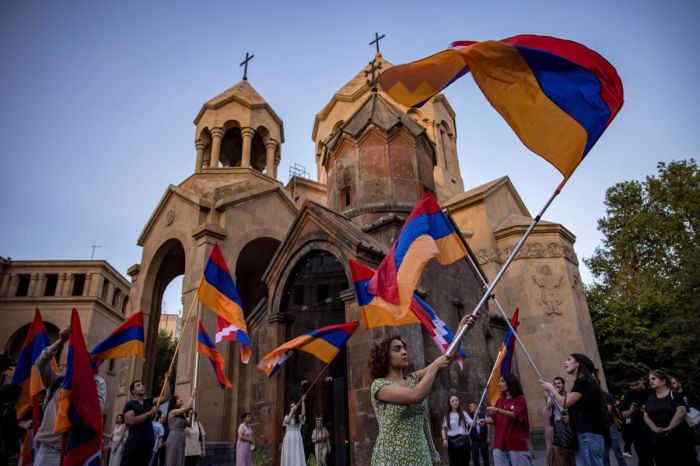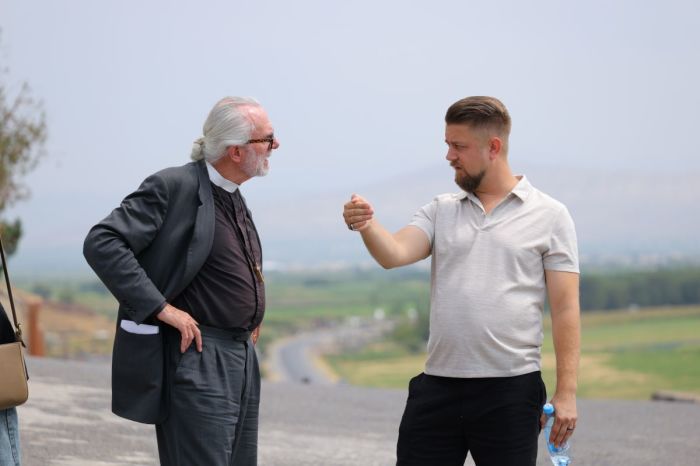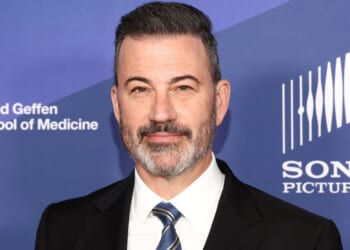
As a veteran international religious freedom advocate who is no stranger to the halls of Capitol Hill, Chelsea Sobolik says she didn’t know as much as she thinks she should have about Armenia’s historic Christian roots before attending a fact-finding trip to the Caucasus country earlier this month.
Sobolik, the director of government relations with the Evangelical humanitarian organization World Relief, who previously worked for the Southern Baptist Convention’s Ethics & Religious Liberty Commission, joined a delegation of Christian leaders and scholars from the United States who met with some of the over 120,000 Armenians forcibly displaced from their ancestral homeland of Artsakh (known internationally as Nagorno-Karabakh) nearly two years ago.
The swift September 2023 military offensive to capture the self-governing democratic region by the Muslim-majority Azerbaijan, which was preceded by a 10-month blockade of food and supplies to weaken the population, drew international media attention and allegations of genocide.
But it wasn’t long before the news cycle moved on to other crises. The plight of the families forced from their homes who saw the torture of their loved ones posted to social media began to fall on deaf ears, even amid reports that Azerbaijan is bulldozing ethnically Armenian residential buildings, neighborhoods and cultural sites despite the United Nations International Court of Justice mandating the right of return for Armenian refugees.
While Armenia is regarded by historical consensus as the first Christian nation established in 301 A.D., this is a fact that appears to be lost on many Christians in the West today, who advocates say Armenian Christians need to be their voice in what seems to be an uphill battle against Azerbaijan’s global economic influence.
“I’m a little embarrassed to admit this, but I had no idea, just the rich Christian heritage in Armenia,” Sobolik told The Christian Post.
“I told some friends where I was going, and half the people I told had no clue where on Earth Armenia even was. And these are people who should be a little bit more informed. So, I think there’s a huge education gap with American Christians.”
The trip opened her eyes, Sobolik said, to the degree of persecution these Armenians faced.
“I hear these stories, and you think Syria, or you think Afghanistan, or you think these horrible places, not Armenia,” she said. “And I think it just, it really opened my eyes to the persecution Christians face in places that aren’t [traditionally thought of as being] the worst of the worst places for Christians in the world.”
The trip organized by the advocacy group Save Armenia and the Tufenkian Foundation ran from July 27 through Aug. 2. Several American Christian leaders visited government leaders, displaced families, a model refugee village and the front lines. The voyage came about a week before U.S. President Trump is set to host leaders of Armenia and Azerbaijan in Washington on Friday for a summit that supporters hope will advance a possible peace deal between the two countries.
Save Armenia Director Matias Perttula said his organization organizes about two to four of these delegation trips each year, framed as a “fact-finding trip” for Christians and conservative leaders whom they hope will mobilize their networks to raise awareness of the issue in U.S. churches and pressure the Trump administration and Congress to act.
“There was just such a lack of knowledge about Armenia, lack of understanding about what’s been going on, and even the history of Armenia as the first Christian country,” he said.
Although Western Christians may look at the map and see that Nagorno-Karabakh is well into the territory of the modern-day borders of Azerbaijan, Perttula stressed that many of the cultural and ethnic artifacts in Artsakh leave no doubt that the land is historically and ethnically a part of Armenia.
“Throughout the centuries, basically, Armenia used to be a lot bigger than it is today. One of the big indicators and proofs that this land, Nagorno-Karabakh, is Armenian is literally in the churches and the monasteries, the cemeteries, the grave sites and other Christian holy sites throughout the region,” he said. “It literally has churches from the early centuries that have been there forever, since basically Christianity started really taking root in the region. These are very, very, very old churches that still stand in Armenia, but they’re very much under threat in Nagorno-Karabakh.”

Philadelphia-based Pastor Bill Devlin, the founder of the nonprofits Widows and Orphans and REDEEM!, who travels the globe to stand in solidarity with persecuted Christians, believes what’s happened to the population and cultural identity of Artsakh meets “the U.N. definition of ethnic cleansing” and genocide.
“Armenia used to be a huge territory, and Turkey has eaten it alive. And Azerbaijan now has eaten it alive. Of course, the Soviet Union ate it alive. And, I describe it as a nation that has been eaten alive. It’s been ravenous, and simply because that nation declared itself a Christian nation by the king 1,900 years ago. It’s heartbreaking to see the disintegration of a nation, but also the desecration of the Christian faith, and it’s very intentional, and it’s all about ethnic cleansing. It’s all about genocide.”
‘Awaken the Church’
Doing some research before the trip, Sobolik said that what stuck out to her was the level of support Armenians received from American Christians when they faced genocide over a century ago, beginning in 1915 during the Ottoman Empire, when as many as 1.5 million Armenians were killed.
“You know, 110 years ago, when the genocide was happening, it was American Christians who stood up and created all these relief efforts to help Armenian Christians,” Sobolik said. “And it really was the birth of the international human rights movement by Christians. I had no idea about that history. If you’d asked me, I would have said it was World War II in the Holocaust, but it was really the Armenian genocide that American Christians, Clara Barton with the Red Cross, went over there. So, I mean, there’s such a rich history with American Christians serving Armenians, and I think it’s really special.”
Perttula said that at the time, it was mostly Mainline denominations that organized the response to the Armenian genocide.
“And I’ve heard the number $2 billion with a B was raised in today’s dollars, basically, to come help these victims of the genocide. And so, we felt like there’s a real calling to kind of return to that and awaken the Church to this to become a force multiplier and, once again, kind of answer that call.”
Sobolik believes several factors are keeping American Christians from rushing to support their Armenian brothers and sisters to the same extent they did over 100 years ago, one of which is “compassion fatigue” in the age of social media.
In 1915, people didn’t have social media to make them aware of every atrocity across the globe. But today, Sobolik said, users are “bombarded every day by atrocities around the world.” As one of the smallest countries in the region, she believes that the plight of the Armenians may also be overshadowed by Christian persecution occurring in larger neighboring countries like Iran and Turkey.
“I do think there is a compassion fatigue that American Christians face,” she said. “I think the other thing is the lack of education. There’s not a huge amount of relief organizations or human rights organizations talking in America about what’s happening or what has happened in Armenia. And so, I think those two things, coupled together, probably have created this gap.”
For Save America, its target group for these awareness delegations is Evangelical Christians, Perttula said, adding that there is a bit of a cultural and theological divide that may spark hesitation for the traditional American church world to engage on this issue.
“A big part of it is understanding that Christians are Christians at the end of the day. And you can argue theology, and you know you can disagree on theological points all day long, but at the end of the day, if you’re living in an area or in a part of the world that’s constantly being persecuted, the persecuting forces really don’t care if you go to a Methodist church or a Presbyterian church or a Catholic church or whatever. At the end of the day, you’re a Christian and you’re a target at that point.”
Devlin believes one factor why Christians in the U.S. haven’t been mobilized to help Armenians is due to narratives put into the Western media by Azerbaijan.
“The federal government of Azerbaijan is spending lots of money in the media, in social media and print media and TV media, crafting a false narrative about Armenia, and the hatred goes so deep,” Devlin said. “They just want to wipe out any vestige of Christianity in Armenia. It’s the jihadist mentality, so that they have a team of people that is undermining in the media, in the blogosphere.”
“So any truth that Armenia gets out there, that is crushed by the federal government of Azerbaijan,” Devlin added.
Sobolik agrees that it’s imperative for American Christians to “be aware of what’s happening to our brothers and sisters across the ocean.”
“You know, I talked to a woman whose sister was a Christian and was brutally murdered by the Azeri army five years ago,” she said. “I mean, things I don’t even want to repeat, they’re so awful. And I mean, she’s my sister in Christ.”
Flaunting torture
The delegation met with family members of people killed by Azeri soldiers in its 2020 military offensive in Nagorno-Karabakh and families of the two dozen Armenians taken hostage, including high-ranking political officials subject to what the European Parliament calls “sham trials.”
Researchers say that Azerbaijani soldiers even flaunted the torture of civilians by disseminating videos of summary executions on platforms like TikTok and Telegram.
Nadine Maenza, who previously chaired the U.S. Commission on International Religious Freedom and co-chairs the International Religious Freedom Roundtable in Washington, D.C., told CP of one social media post featuring a woman whose throat was cut in the shape of a cross.
“They cut a cross into her throat and put the picture up on social media for the world to see,” Maenza said.
Charmaine Hedding, a Jerusalem-based advocate who heads the Shai Fund working in conflict zones to help build resilience for Christian communities and religious minorities, has visited Armenia several times in her career. She said the delegation heard about “rapes, mutilation and [soldiers] terrorizing anyone that they managed to capture.”
“And then a number of the cases I spoke to and heard about, it was, for example, like this, where they did things like cut off body parts and stuff them in their mouth or cut off their ears and basically slowly killed the live hostages that they caught, uploaded it onto social media, and that’s how a lot of the family members found out what happened to their loved ones,” Hedding said.
Although some international human rights watchdogs like USCIRF have criticized the Azerbaijani military’s treatment of Armenian civilians, Hedding believes international bodies have failed to hold Azerbaijan accountable because of the country’s economic impact.
“I mean, it’s clear no one wants to touch Azerbaijan because they have oil and Turkey, and they sell it to Europe,” she said. “One way to stop all of this is to decrease their influence. Of course, I believe they should be sanctioned for the human rights abuses that they have committed, and it’s clear what they’ve been able to do with relatively carefree abandon, with no one really coming against them.”
Maenza told CP that the Azeri army made announcements in Artsakh villages for residents to flee in the hours before the offensive in 2023. She said the residents didn’t even have time to grab clothes before they were forced to flee their homeland into Armenia proper, where they have been welcomed and sheltered by the local population.
Armenian government assistance has ended for many of these displaced families, causing a new level of panic to find housing. While some displaced individuals still in Armenia have found their footing, groups like the Shai Fund and the Tufenkian Foundation are working to find solutions for those who need to find housing and jobs.
“A lot of them are going back into crisis mode, and they’ve had to move pretty often, so without any stability, and having to move around based on what’s available with the government,” Hedding said. “They haven’t been able to really set up businesses or hold down stable jobs.”
Reason for optimism?
Reports this week that Trump is hosting Armenian and Azeri leaders in Washington on Friday have sparked a level of cautious optimism that things might be turning a corner.
“We can change this obviously, if America will get involved and bring people into Armenia to start working on this peace agreement that we’re hearing about increasing the [transport] corridors, as long as there are guarantees that Azerbaijan won’t be able to take over more land,” Hedding said. “Because already, we are concerned. They are calling Armenia ‘Western Azerbaijan.’ And of course, Azerbaijan has never, ever had any influence, and doesn’t even have the population in Armenia, in order to call it that.”
Sobolik said that in their meetings with government officials, what they constantly asked for was the “right of return for people from Artsakh to go back home if they’re able” and the release of the hostages.
“I’ll be curious to see A, if a [peace deal] actually gets signed, and B, what the next couple years look like for relations between Armenia and Azerbaijan and the region. But, it’s a huge step in the right direction of signing a peace deal and working towards that.”
















